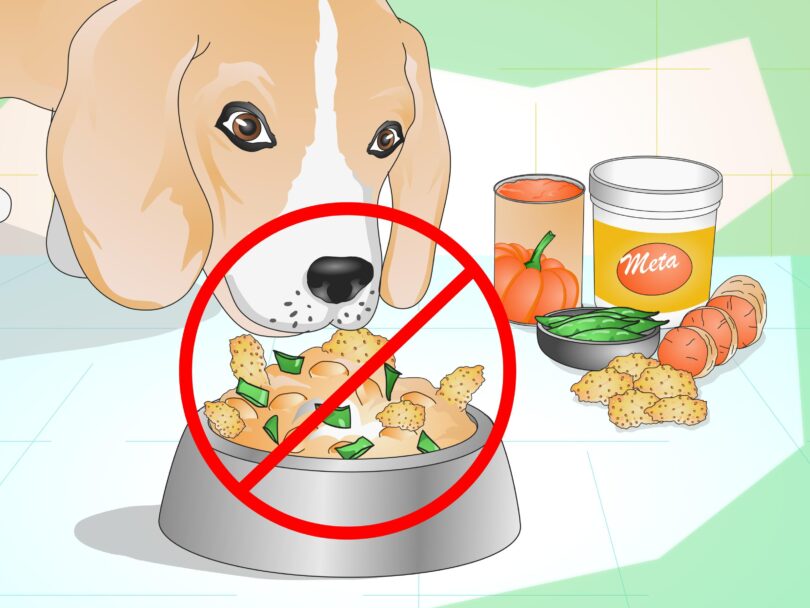Dogs, our loyal companions, are often regarded as part of the family. They share our homes, our hearts, and sometimes even our food. However, while it might be tempting to let them nibble on whatever’s on your plate, certain foods can be downright dangerous—even deadly—for our canine friends. It’s crucial to be informed about what dogs can and cannot eat. Let’s dive into the details and explore the top 10 foods that should never make their way into your dog’s bowl.
1. Chocolate: The Sweet but Deadly Temptation
You might be thinking, “But I love chocolate! How could it possibly be bad?” Well, dogs don’t process chocolate the same way we do. Chocolate contains theobromine, a compound that dogs metabolize very slowly, leading to toxic build-up in their system.
Why Is It Dangerous?
Theobromine affects the heart, central nervous system, and kidneys. Even a small amount can cause vomiting, diarrhea, tremors, seizures, and in severe cases, death. Dark chocolate and baking chocolate are particularly high in theobromine, making them even more dangerous.
Fun Fact: A small dog weighing around 10 pounds could be severely affected by just one ounce of dark chocolate. That’s about the size of a small piece of chocolate cake!
2. Grapes and Raisins: A Tiny Fruit with Big Risks
This one might surprise you—grapes and raisins seem harmless, right? They’re small, bite-sized, and seemingly perfect for a quick treat. However, these fruits can cause severe kidney damage in dogs.
The Mystery of Toxicity
The exact substance in grapes and raisins that causes toxicity in dogs is still unknown, but the results are clear. Even a small amount can lead to sudden kidney failure. Symptoms include vomiting, lethargy, and loss of appetite.
Real-Life Example: There was a case where a Labrador retriever ate a small handful of raisins and ended up requiring extensive veterinary care to survive. It’s a stark reminder of how dangerous this seemingly innocent snack can be.
3. Onions and Garlic: More Than Just Bad Breath
Onions and garlic might add flavor to your dishes, but they can wreak havoc on your dog’s red blood cells, leading to anemia.
Understanding the Culprit
These foods contain thiosulfate, which is toxic to dogs. Whether raw, cooked, or powdered, onions and garlic should be kept far away from your furry friend. Even foods like onion powder in baby food have been known to cause poisoning in dogs.
Symptoms to Watch For: Weakness, vomiting, breathing difficulties, and a reddish tint to the urine are all signs that your dog might have ingested something they shouldn’t have.
4. Xylitol: The Sweetener That’s Anything But Sweet
Xylitol is a sugar substitute found in many sugar-free products, including gum, candy, baked goods, and even some peanut butter brands. While it’s safe for humans, it’s extremely toxic to dogs.
What Makes Xylitol So Dangerous?
When a dog ingests xylitol, it rapidly causes a surge in insulin, leading to a dramatic drop in blood sugar (hypoglycemia). This can happen within 10-60 minutes of ingestion, and if left untreated, it can lead to liver failure and death.
Quick Tip: Always check the label before sharing any human food with your dog, especially if it’s sugar-free. Xylitol can hide in many products, so it’s better to be safe than sorry.
5. Avocado: A Healthy Snack for Humans, a Hazard for Dogs
Avocado has become a trendy superfood for humans, but it’s not so super for dogs. The fruit contains persin, a fungicidal toxin that can cause problems for your pet.
The Avocado Debate
While the flesh of the avocado is less toxic than the pit, skin, or leaves, it’s still best to avoid giving it to your dog. Ingesting large amounts of avocado can lead to vomiting, diarrhea, and even pancreatitis.
Did You Know? Birds, rabbits, and some other animals are also highly susceptible to persin toxicity, so if you have other pets, keep the guacamole out of reach for everyone!
6. Alcohol: More Than Just a Bad Idea
It might seem obvious, but alcohol is extremely dangerous for dogs. Even small amounts can lead to significant problems, including alcohol poisoning.
Why Dogs Can’t Handle Their Liquor
Alcohol has the same effect on a dog’s liver and brain as it does on humans, but it takes much less to cause harm. Symptoms of alcohol poisoning in dogs include vomiting, disorientation, high body temperature, restlessness, and muscle tremors. In severe cases, it can cause coma or death.
A Word of Caution: Be mindful of alcohol in unexpected places, like unbaked bread dough, which contains yeast that can ferment in a dog’s stomach, producing alcohol.
7. Macadamia Nuts: A Nutty Threat
Macadamia nuts are a popular snack for humans, but they’re incredibly toxic to dogs. Even a small amount can cause severe symptoms.
What’s the Deal with Macadamia Nuts?
The exact cause of macadamia nut toxicity in dogs is unknown, but the effects are well documented. Dogs that have ingested macadamia nuts may experience weakness, depression, vomiting, tremors, and hyperthermia. These symptoms usually appear within 12 hours and can last for up to 48 hours.
Pro Tip: It’s best to keep all nuts out of your dog’s reach. While macadamia nuts are the most dangerous, other nuts can also pose a choking hazard or lead to digestive issues.
8. Coffee and Caffeine: Perking Up Isn’t for Pooches
Coffee, tea, and other caffeinated products are staples in many households, but they can be lethal to dogs. Caffeine is a stimulant that affects the central nervous system and heart.
Why Caffeine Is a No-Go
Dogs are much more sensitive to caffeine than humans. Even small amounts can lead to restlessness, rapid breathing, heart palpitations, and muscle tremors. In severe cases, it can cause collapse or death.
Important Reminder: Keep coffee grounds, tea bags, and energy drinks well out of reach. If your dog accidentally consumes caffeine, seek veterinary attention immediately.
9. Dairy Products: Not Every Dog Loves Ice Cream
While some dogs can tolerate dairy in small amounts, others may have trouble digesting it. Most dogs are lactose intolerant, which means they lack the enzyme needed to digest lactose, the sugar found in milk.
The Dairy Dilemma
Feeding your dog dairy products can lead to digestive upset, including diarrhea and vomiting. In some cases, it can also cause allergic reactions. If you want to treat your dog, it’s better to opt for dairy-free alternatives specifically designed for pets.
Fun Fact: While many dogs enjoy the taste of cheese, it’s high in fat and can contribute to obesity and pancreatitis. Moderation is key if you choose to share a small piece with your pup.
10. Bones: A Classic Treat with Hidden Dangers
It’s a common image: a dog happily chewing on a bone. However, bones, especially cooked ones, can be hazardous.
The Risks of Chewing Bones
Cooked bones can splinter and cause choking, blockages, or tears in the digestive system. Even raw bones, which are safer, should be given under supervision to prevent injury.
Better Alternatives: Consider giving your dog specially designed chew toys or bones made for dogs. These products are safer and can provide hours of entertainment without the risk of injury.
Conclusion: Keeping Your Dog Safe and Happy
As dog owners, it’s our responsibility to ensure that our pets stay safe and healthy. By being aware of the foods that are dangerous to dogs, we can prevent accidental poisoning and keep our furry friends happy and healthy.
Remember, if you suspect your dog has eaten something harmful, it’s always best to contact your veterinarian immediately. Quick action can make all the difference.


